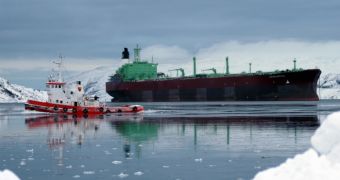The giant oil tanker Ob River might become the first ship to ever cross the Arctic Ocean.
The tank is transporting liquefied natural gas and after leaving Hammerfest, Norway on November 7, has passed Northern Russian coast, now heading to Japan.
The ship is escorted along its way by Russian nuclear-propelled icebreakers and it’s estimated to arrive at the destination at the beginning of December 2012, Global Post reports. (Track Ob River here)
Ob river, originally owned by the Greek company Dynagas, has later been taken by the Russian Gazprom and its current sailing crew consists of 40 people from different countries around the world.
Besides being a very profitable action, the participants also see the expedition as a great adventure.
“It's an extraordinarily interesting adventure,” declared Dynagas Director Tony Lauritzen.
“The people on board have been seeing polar bears on the route. We've had the plans for a long time and everything has gone well.”
People in charge of the expedition say that the novel project was made possible by the increasing climate warming, which caused ice melting in Arctic Ocean.
“We have studied lots of observation data - there is an observable trend that the ice conditions are becoming more and more favorable for transiting this route,” explained Tony Lauritzen.
“You are able to reach a highly profitable market by saving 40% of the distance, that's 40% less fuel used as well.”
Besides the sense of novelty and adventure, the fundamental reason of the Arctic Crossing was undoubtedly an economical one.
Due to internal economic reasons, Japan has lately become an important market for the natural gas trading. The Arctic crossing makes the shortest and the less expensive way towards it.
“The major driver is the export of resources from the Arctic region, not the fact that you can transit across the Arctic sea,” said Gunnar Sander, an expert of the Norwegian Polar Institute.
Experts assume that the climate and trading changes will lead to a rapid intensification of the traffic in the Arctic waters.

 14 DAY TRIAL //
14 DAY TRIAL //